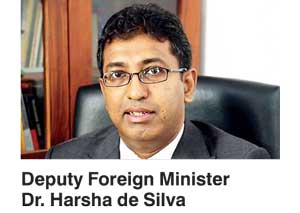Thursday Feb 26, 2026
Thursday Feb 26, 2026
Thursday, 27 April 2017 00:10 - - {{hitsCtrl.values.hits}}
By Dharisha Bastians
The Government yesterday said it was confident that an eleventh hour objection to granting Sri Lanka the GSP+ trade concessions would not carry, as a resolution opposing the country’s bid is put to a vote in the European Parliament in Brussels today.
“The tide is rising,” tweeted Deputy Foreign Minister Dr. Harsha De Silva, who is in the EU capital for talks with Members of the European Parliament ahead of today’s vote and the mid-May approval deadline.
Dr. De Silva, who is also on a study tour in Brussels in his capacity as a member of the parliamentary oversight committees COPE and the Public Accounts Committee (PAC) told Daily FT that in his meetings with a wide range of MEPs, he had made “technical, political and economic arguments” to address areas of concern. “I had meetings with most of the key members who are opposing the granting of GSP+ to Sri Lanka,” Dr. Harsha told Daily FT from Brussels. “I am absolutely confident we will make it through the vote.”
The vote is scheduled any time after 3.00 p.m. local time, which is 11.30 a.m. in Brussels.
A bloc of Parliamentarians from the European United Left/Nordic Green Left mounted an eleventh hour bid last week to prevent Sri Lanka being granted the import duty concessions on the basis of the Government’s slow progress on democratic and legislative reform.
In their motion for resolution, the 52 Members of the European Parliament (MEPs) referenced a report to the Human Rights Council in Geneva last month, in which the Office of the High Commissioner of Human Rights that measures taken by Sri Lanka since October 2015 to fulfill commitments had been “worryingly slow”.
If the resolution submitted by the 52 MEPs is backed by a majority of 376 in the European Parliament during its plenary session this week, the motion will be carried and Sri Lanka’s application for GSP+ concessions will be rejected this year.
In a post on his official Facebook page, the Deputy Foreign Minister added that together with Sri Lanka’s Ambassador in Brussels Rodney Perera, he had explained all the work the Government had done to improve democracy, governance, rule of law human rights and reconciliation. “By and large they are satisfied with the progress, albeit some areas have been slow,” he added.
The EU withdrew the coveted tariff concessions from Sri Lanka in 2010, in the face of the country’s deteriorating human rights record and failure to comply with its international human rights obligations under the administration of President Mahinda Rajapaksa. After President Rajapaksa’s defeat in 2015 elections, the new Government reapplied for the import duty concession. The duty concessions make Sri Lankan exports to the 28-member European Union cheaper and more competitive. The concessions are particularly valuable to the apparel, rubber products and ceramics industries. The EU as a bloc is Sri Lanka’s main export destination, absorbing 31 % of Sri Lankan exports in 2015, and the country’s second largest trading partner after India.